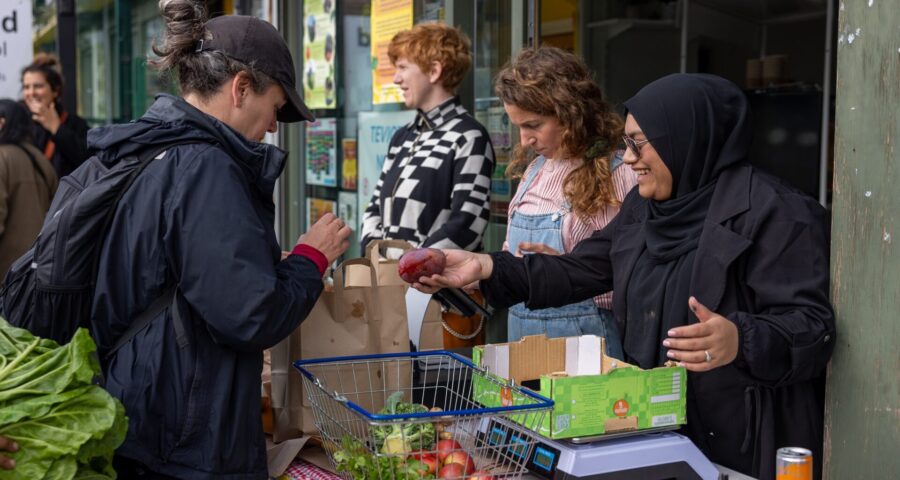Shoppers in Tower Hamlets are replacing an average of £8 worth of non-organic fruit and veg with organic alternatives thanks to an innovative project, Bridging the Gap, which aims to connect people on low incomes with affordable organic produce.
Our new report reveals the incredible impact our work as part of the Bridging the Gap project is having in the London Borough of Tower Hamlets in improving access to organic food and giving residents a sense of control over their food choices, food environment and their children’s health.
Rose Vouchers, alongside a discount on organic fruit and veg at two local food co-ops, are supporting residents to access affordable organic produce on their doorstep. Based at the Teviot Centre and Limehouse Town Hall, the co-ops have swapped to organic fruit and veg provided by organic food hub Better Food Shed at no extra cost to customers.
Our Impact and Evaluation Manager, Michelle Green, explains:
“For people living in Tower Hamlets, there are few easily accessible and affordable local fruit and veg retailers – and even fewer offering organic produce. As part of Sustain’s Bridging the Gap project, we’re working in partnership with Growing Communities, the Women’s Environment Network and Leaders in Community to help people access climate and nature-friendly food in their community, regardless of their income.”
“Our latest evaluation of the project has shown promising results with increased organic purchases and loyalty to the food co-ops, who give shoppers reassurance and trust in where their food has come from. Combined with Rose Vouchers being accepted as payment, many people now report being able to choose to buy organic produce for the first time.”
Key findings reveal:
- Subsidising the cost of organic fruit and veg enables residents to make a genuine choice between organic and non-organic produce: Many customers are opting for organic produce, with shoppers replacing £8 worth of non-organic fruit and veg with organic alternatives. The discount, combined with Rose Vouchers, has enabled many people living on low incomes to try organic produce for the first time, helping them to diversify their diets. At the Teviot Centre food co-op, up to two-thirds of customers are likely to live on low incomes, and 37% of them are using Rose Vouchers to make their purchases.
- Improving access to organic food gives residents a sense of control over their food choices, food environment and their children’s health: Affordable organic produce is giving residents a greater sense of control over their food choices and a greater connection with their food environment. With cost now less of a barrier, residents have the space to think more critically about their food sources and make decisions that align with their values and preferences.
- Introducing a local and organic supply chain benefits local farmers and the planet: By partnering with Better Food Shed, who connect organic farms in the UK and Europe to customers, the pilot has benefitted 25 local farmers and UK farms, who receive 84% of the money made from their produce. A study by the New Economics Foundation found that every £1 spent on organic veg with Growing Communities generates £3.70 of value for the customer, farmers, and the planet.
Melanie, the project lead at Teviot Centre Food Co-op, tells us:
“The co-op has a number of very loyal customers. We get such positive feedback, with families coming every week. Some families are coming to us specifically because of the organic offer, convenience and how affordable the produce is. I now stay open an hour later to accommodate school pick-up, so parents have a chance to shop after school.”
She also noted the significant impact Rose Vouchers have had on families:
“I have seen Rose Vouchers make a big difference for families. Their fruit and veg intake has increased and I’ve had young kids commenting on different tastes of cucumber, saying they prefer the taste of the cucumber from our food co-op. It’s amazing to be influencing children from a young age to develop these tastes and grow up with a certain palette and a desire for food that’s going to help keep them well.”
As we continue to monitor the progress of this pilot, we hope to demonstrate how voucher projects and other financial incentives can offer dual climate and health benefits for communities.
Photo by Sylvie Belbouab

